Why We Are World Schooling Our Kids
We are unenrolling them from the system and exploring education outside the classroom.
“This is SO good that you’re getting all this travel in before your kids start school.”
I shifted my eyes to meet Flynn’s and we shared a knowing look.
This wasn’t the first time we’ve had to respond to this statement.
I used to feel uncomfortable, but now I just say it like it is.
We aren’t putting them in school.
This is usually followed by a raised eyebrow and the next question of, “Oh, so you’re homeschooling them?”
Not really.
In fact, we are planning on “unschooling” our girls.
We are planning to completely opt out of the Canadian curriculum and instead, introduce them to World Schooling.
Our Vision for World Schooling
I didn’t even know world schooling was a thing.
Two years ago, a couple from Vancouver reached out to us because they saw a YouTube interview we did on a popular investing channel.
We invited them over to our home to exchange stories, talk about investing and hear about their travel life.
As a family, they had part time traveled for years and told us the amazing stories of all the experiences they had while they world schooled their kids.
We were hooked. The idea took hold.
The vision for our future shifted.
But what is world schooling?
Since spending time on niche Instagram accounts, YouTube and meeting new friends in real life, we’ve come to define world schooling as this:
An education that allows our girls to experience in real life the things they would have learned sitting at a desk.
It’s a neat combination of forest school, self directed education that follows their interests, and learning through experience.
For example, instead of learning Spanish in a classroom, they learned it by speaking with the waitress at a restaurant in Panama.
Instead of studying biodiversity from a textbook, they’ll walk the jungles of Costa Rica and witness all of the life uncovered at low tide in the Pacific Northwest.
I want them to experience other cultures, seasonal celebrations and ways of living from around the world.
I still plan on teaching them to read, write and do math, but centered around their interests.
We get to raise them as kids of the world where we have full control over what is taught to them at what age and by who.
I want to know that they are being taught freedom, emotional intelligence and allowed to remain a child for as long as possible.
Learning Beyond the Classroom
There are opportunities everywhere if you look for them.
Yesterday, our family went on a rainy forest walk alongside a creek to witness the salmon returning home to spawn.
There were colorful signs that I read aloud to our girls, explaining how important salmon are to the ecosystem, how the plant life around the creek supports the salmon’s return home and the life cycle that begins and ends in the same stream.
We sat on the shore and cheered on the salmon as they swam, wiggled and jumped upstream against the current.
It was so exciting for the girls (and me!).
When we returned home, we watched a short YouTube video on the life cycle of salmon so they could connect what they saw with the bigger journey this fish went on.
I’ll never forget the experience and I imagine it’ll stick with them more than if they had read it in a book.
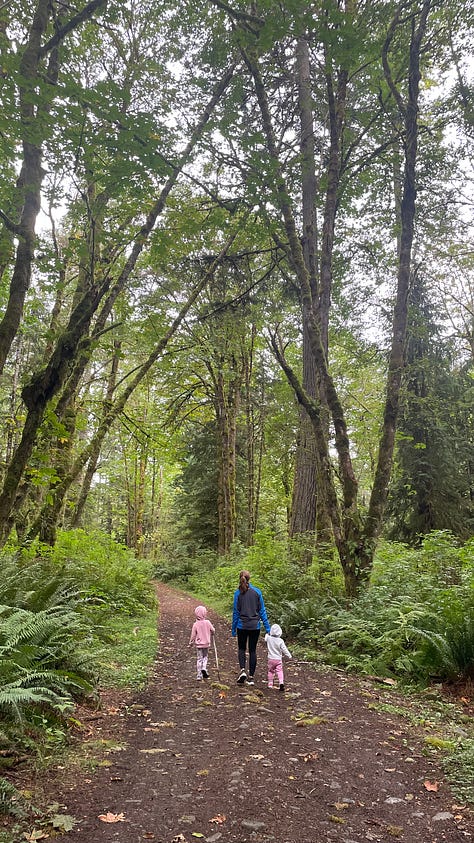
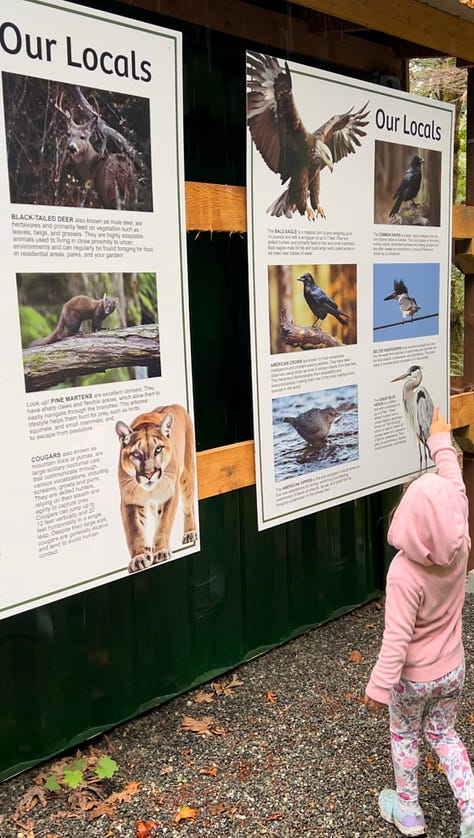
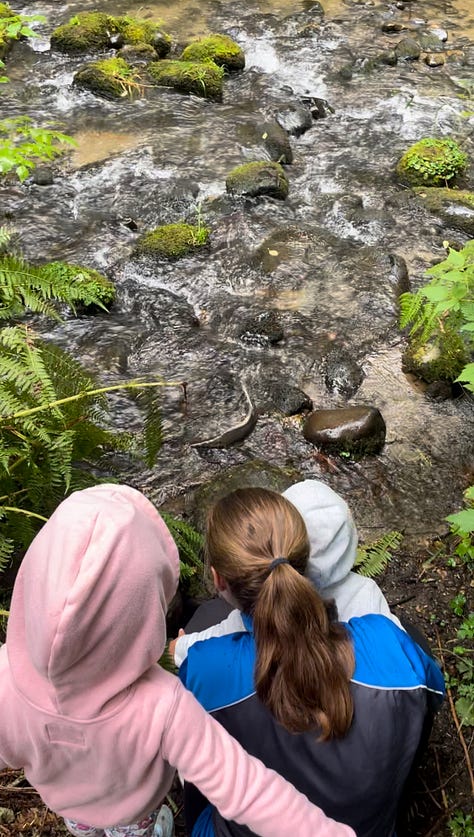
Another favorite world schooling experience happened in Nueva Gorgona, Panama in February this year.
On one of our long morning beach walks, we crossed paths with the fishermen that were returning home from sea.
We were able to (in our broken Spanish) buy fresh fish for only $2 per fish.
They were gutted and cleaned for us on the beach and the girls were given fresh oranges to enjoy while we waited.
Not only were we able to support a small local business, but we experienced the Panamanian culture and language first hand.
We took the fish home and fried it for a delicious breakfast.
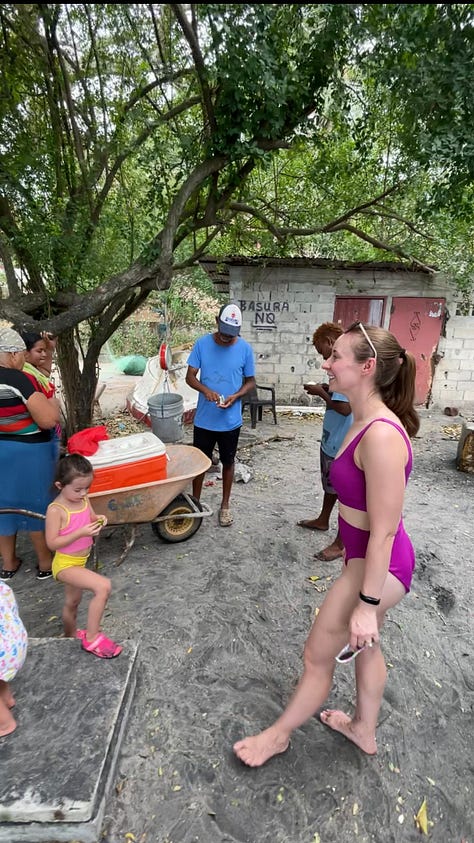

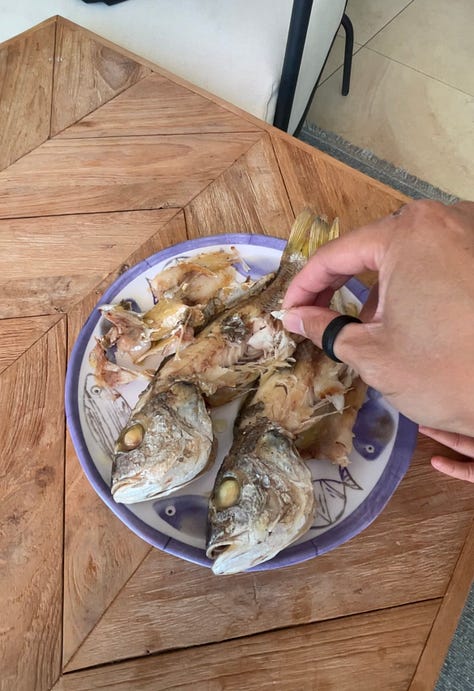
But Aren’t You Worried About…
Naturally, when we try to explain world schooling, we are met with curious questions.
One of the biggest questions is how will we socialize our kids?
This is an easy one.
School was not a good experience for me. I was picked on from grade 3 through grade 12, which created social anxiety that I still deal with today as an adult.
I struggle to make small talk and new friendships.
I don’t think school helped socialize me at all. The opposite was true in my case.
After grade 9, I got caught up with the wrong crowd and went down the rabbit hole of partying, raves, boys and drugs because of who I met in school.
Although I know in the end, it’s out of our control, we hope that with world schooling, we can be intentional about the environment our kids are in.
We plan on putting them in swimming lessons and activities, as well as seeing their friends socially while we are home in Vancouver.
But I’m not worried for now. It’s a bridge I’ll cross when I get there.
Many other world schooling parents have expressed that their kids begin to crave routine and friendships and want to stop traveling around 12 to 13 years old.
They want to go back to school.
And if our kids want to pursue a career that requires higher education, they’ll need to reintegrate to the school system at some point.
But since our girls are only 2 & 4, I’ll delegate that worry to the future.
What We Are Looking Forward To
There are these awesome world schooling hubs around the world that we are excited to start exploring in a year or two.
In places like Costa Rica, Portugal, Spain and parts of SouthEast Asia, other world schooling families gather and live together as a community for a few months at a time.
This creates friendships for the parents and the kids and allows the group to do activities together and learn about the country they are in.
While I don’t know a ton about this yet as it’s not on our immediate horizon, it’s exciting and I’m looking forward to researching it and sharing our experience as we grow.
Final Thoughts
When I graduated high school, I didn’t learn any useful skills to help me in the real world.
I couldn’t speak another language, write a check, make a budget, or understand the process for getting a mortgage.
I didn’t know how to book plane tickets, negotiate at a market or understand what it was like to live with people who looked at life differently than me.
I was not taught how to manage my brain, run a business, open a bank account or invest my money.
I never learned to prioritize exercise, schedule my time, make a healthy meal, get really restorative sleep, or file my taxes.
All of the pieces of me that helped create this lifestyle weren’t learned in school.
They were learned in real life - not through memorizing cell biology, solving calculus math problems, reading outdated books or being taught a one sided view of history.
They were learned in the SCHOOL of real life.
With real world experience.
This is the school I want to raise my kids in.
Tanessa




